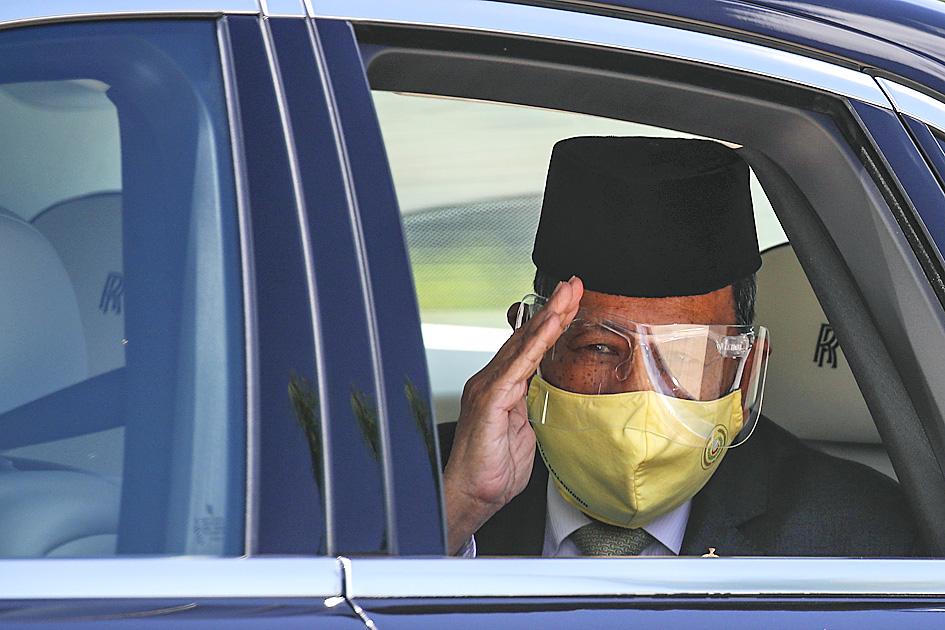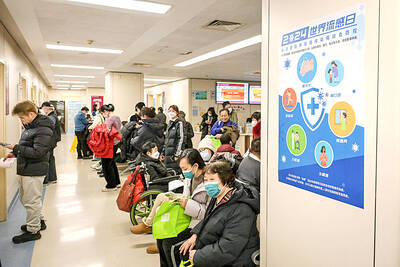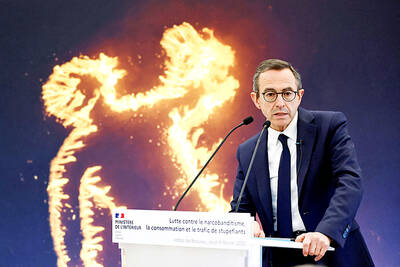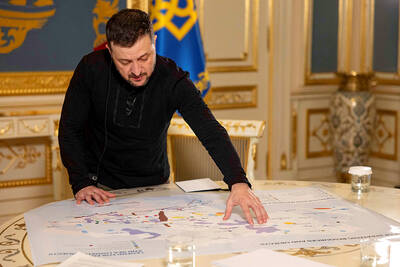Malaysia’s royal leaders were to meet yesterday amid growing public anger over the Malaysian government’s handling of the COVID-19 pandemic during a state of emergency that has left democracy suspended for a year.
The meeting, to be chaired by Malaysian King Sultan Abdullah Sultan Ahmad Shah at 2:30pm, comes as daily COVID-19 infections averaged about 5,800 in the past seven days, nearly double than when Malaysia declared emergency rule in January.
“The issue now is whether the emergency, which is set to end Aug. 1, should be continued,” Asyraf Wajdi Dusuki, the head of the ruling United Malays National Organization’s youth wing, wrote on Facebook on Monday. “What’s the use of an emergency if it’s not helping the people?”

Photo: EPA-EFE
Malaysia’s move to declare a state of emergency was the first in more than half a century. It allowed embattled Malaysian Prime Minister Muhyiddin Yassin to suspend parliament and enact emergency laws without legislative approval, with the aim of bringing the outbreak under control. That also meant no snap polls could be called during that period.
The king might be contemplating doing two things, said Oh Ei Sun, a senior fellow at the Singapore Institute of International Affairs. “Number one is whether to convene parliamentary sitting, even if emergency is ongoing, and number two is a more fundamental question, whether to extend the emergency beyond the first of August.”
Malaysia on Friday extended a nationwide lockdown by another two weeks as the number of COVID-19 cases remained high. Only essential sectors may operate, while movement is limited to a 10km radius.
The measures could kill off the country’s manufacturing sector, the Federation of Malaysian Manufacturers said on Saturday.
The rulers are unlikely to make major political decisions, said James Chin, a professor at the University of Tasmania.
“The royals want to be seen as above politics, so whatever they do, it will be seen as a suggestion, rather than an order,” Chin said.
However, they are under tremendous pressure to tell Muhyiddin to reconvene parliament, he added.
The Malaysian Parliament would be allowed to meet in September or October in the third phase of a recovery plan announced by Muhyiddin in an address on Tuesday.
Malaysia would enter this phase once daily COVID-19 cases fall below 2,000 and 40 percent of the population is fully vaccinated, he said.
This is the second rulers’ gathering since the king ascended the throne and comes after he gathered feedback from political leaders last week.
The last meeting, held in October last year, resulted in the monarch rejecting Muhyiddin’s initial attempt at seeking an emergency rule.
After staying in the background of national politics for decades, the king last year began moving center stage to fill a vacuum following the resignation of then-Malaysian prime minister Mahathir Mohamad. The king resolved a week-long impasse by tapping Muhyiddin to become prime minister without a parliamentary vote after opposition leaders had sought meetings with the king while vying for power.
“This meeting further exhibits that the royalty will continue playing an expanding and conspicuous role in the Malaysian political landscape,” Piya Sukhani, a political analyst at Nanyang Technological University, said by e-mail.

RIGHTS FEARS: A protester said Beijing would use the embassy to catch and send Hong Kongers to China, while a lawmaker said Chinese agents had threatened Britons Hundreds of demonstrators on Saturday protested at a site earmarked for Beijing’s controversial new embassy in London over human rights and security concerns. The new embassy — if approved by the British government — would be the “biggest Chinese embassy in Europe,” one lawmaker said earlier. Protester Iona Boswell, a 40-year-old social worker, said there was “no need for a mega embassy here” and that she believed it would be used to facilitate the “harassment of dissidents.” China has for several years been trying to relocate its embassy, currently in the British capital’s upmarket Marylebone district, to the sprawling historic site in the

A deluge of disinformation about a virus called hMPV is stoking anti-China sentiment across Asia and spurring unfounded concerns of renewed lockdowns, despite experts dismissing comparisons with the COVID-19 pandemic five years ago. Agence France-Presse’s fact-checkers have debunked a slew of social media posts about the usually non-fatal respiratory disease human metapneumovirus after cases rose in China. Many of these posts claimed that people were dying and that a national emergency had been declared. Garnering tens of thousands of views, some posts recycled old footage from China’s draconian lockdowns during the COVID-19 pandemic, which originated in the country in late

French police on Monday arrested a man in his 20s on suspicion of murder after an 11-year-old girl was found dead in a wood south of Paris over the weekend in a killing that sparked shock and a massive search for clues. The girl, named as Louise, was found stabbed to death in the Essonne region south of Paris in the night of Friday to Saturday, police said. She had been missing since leaving school on Friday afternoon and was found just a few hundred meters from her school. A police source, who asked not to be named, said that she had been

BACK TO BATTLE: North Korean soldiers have returned to the front lines in Russia’s Kursk region after earlier reports that Moscow had withdrawn them following heavy losses Ukrainian President Volodymyr Zelenskiy on Friday pored over a once-classified map of vast deposits of rare earths and other critical minerals as part of a push to appeal to US President Donald Trump’s penchant for a deal. The US president, whose administration is pressing for a rapid end to Ukraine’s war with Russia, on Monday said he wanted Ukraine to supply the US with rare earths and other minerals in return for financially supporting its war effort. “If we are talking about a deal, then let’s do a deal, we are only for it,” Zelenskiy said, emphasizing Ukraine’s need for security guarantees